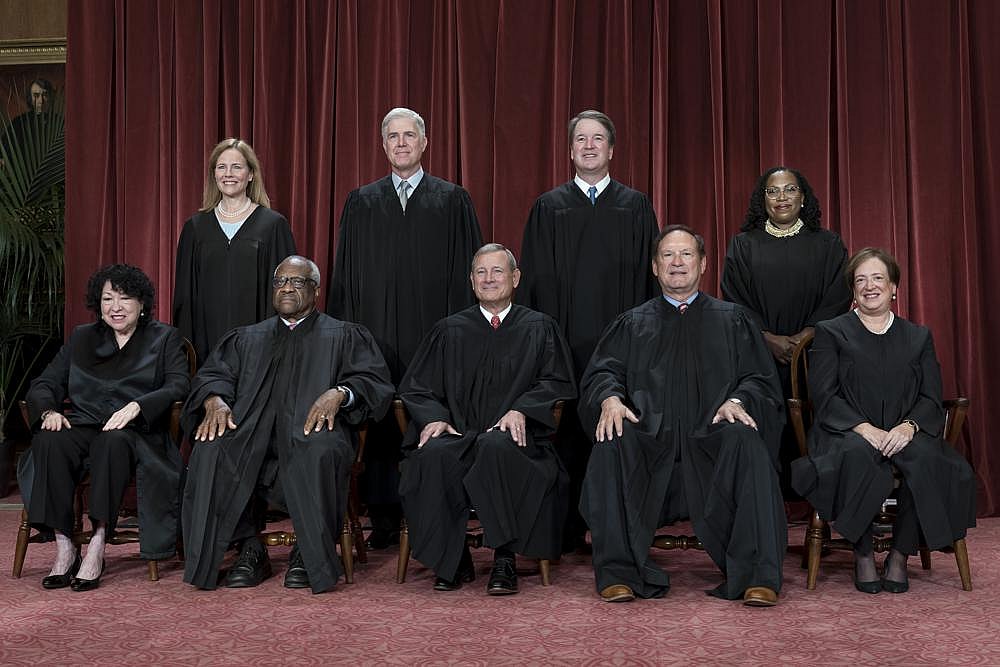Less than three months remain in the United States Supreme Court’s current session as many await the justices’ rulings in several landmark cases that could significantly impact Black communities.
Student loan debt forgiveness
On Feb. 28, the Supreme Court heard oral arguments in Biden v. Nebraska and Department of Education v. Brown to determine if President Joe Biden’s student loan debt relief program was constitutional, as theGrio previously reported.

The question before the justices is whether the Biden-Harris administration has the authority under The Heroes Act to eliminate student debt for qualified borrowers.
In August 2022, Biden announced a plan to address the student loan debt crisis that eliminates up to $20,000 in student debt for borrowers who received a Pell Grant and up to $10,000 for borrowers who did not receive the grant.
In an interview with theGrio, Rakim Brooks, president of Alliance for Justice, said, “Black borrowers, in particular, are heavily burdened by debt – both undergraduate and graduate level debt.”
If the Supreme Court permits the Biden-Harris administration’s student debt loan forgiveness plan to proceed, Brooks explained that “70% of Black folks could potentially have most, if not all, of their debt, extinguished.”
However, if the high court finds that the administration exceeded its authority by creating the student debt plan, Brooks said, “People will continue to be saddled with this debt for several more years, if not the rest of their lives.”
Affirmative Action in college admissions
Another issue hanging in the balance is whether the court will reverse affirmative action in the college admissions process, which could make it harder for Black students to get accepted into predominantly white institutions, as theGrio previously reported.
In November 2022, the Supreme Court heard oral arguments after the Students for Fair Admissions (SFFA) filed suits against the University of North Carolina (UNC) and Harvard University for discriminating against Asian and white students during the admissions process.
In SFFA v. UNC, the organization alleges UNC discriminated against both Asian and white Americans; and in the Harvard case, SFFA alleges the Ivy League university discriminated against Asian Americans by granting Black and Latinx students what the plaintiff claims is an unfair advantage while applying to the institutions.
Attorney Sue-Ann Robinson previously told theGrio that affirmative action is “not about taking away from white people.”

She added, “Affirmative action was always about giving qualified people opportunities because of the inequality created by historical, systemic racism and sexism.”
Brooks told theGrio there would be “less diverse campuses” if the court rules in favor of SFFA.
“We’re going to have a less inclusive environment and people are going to feel less and less as though they belong in our institutions of higher learning,” he explained.
He added this is “really a case that will determine the future of inclusivity in the country.”
Gerrymandering
Lastly, the Supreme Court will soon rule on a gerrymandering case that will determine whether a congressional redistricting map is constitutional or violates the Civil Rights Act.
In October 2022, the Supreme Court heard oral arguments in Allen v. Milligan to determine whether Alabama’s 2021 congressional redistricting map dilutes the voting power of Black communities, according to Southern Poverty Law Center.
Brooks told theGrio that if this case is overturned, progress made during the civil rights movement “will be in jeopardy.”
He added, “You would think that in the 2Ist Century…we would be headed towards a more inclusive, more participatory democracy as opposed to one that resembles something from the 19th century.”

It is unclear when the Supreme Court plans to release opinions in these landmark cases; however, they have until the end of their session in late June.
“You would think that in the 21st century, we would be headed towards a more inclusive, more participatory democracy as opposed to one that resembles something from the 19th century,” said Brooks.
TheGrio is FREE on your TV via Apple TV, Amazon Fire, Roku and Android TV. Also, please download theGrio mobile apps today!

